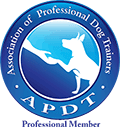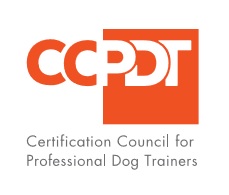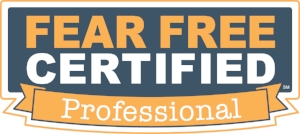Archive CF :: Puppy Socialization
All young animals experience a developmental stage during which they discover the things that are necessary to, and the things that threaten, their survival. For dogs, this sensitivity period lasts until somewhere between 13 and 16 weeks. The things they have not experienced during this time will be things that, later in life, they will be cautious of or, worse, aggressive towards.
Every moment is valuable. There's no such thing as over-socialization! Here's what your puppy needs to learn before it's too late...
Socialization to People
| People come in all shapes and sizes and this is something your puppy needs to know. For starters, many dogs are a little more concerned about men because of their size, their deep voices, and their more abrupt movements. Teach your puppy that big, tall men are just as friendly and welcoming as petite women with sweet, happy voices, that children make fun playmates, and that all types of people promise treats and love. Human attire can also make people look very different: overcoats, sunglasses, hats, facial hair, canes and wheelchairs, tool belts and uniforms. Even luggage, grocery bags, and wheelie objects like skateboards and bikes can make a human look other than human in a dog's eyes. So when out for a walk or while |
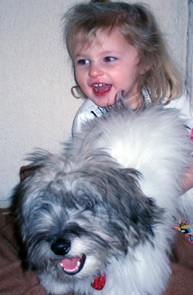
|
And so, in this way, people with walkers or canes, firemen with uniforms and big tool belts, little children, and indeed people from every walk of life will set your pup's tail a'waggin'!
Socialization to Dogs
Puppies get their earliest educations from their mother and siblings. And if your puppy is from a breeder, she has seen to it that the puppies are not removed from this important learning experience too soon. In any case, you must continue your pup's education when you take her home.
There is an unfortunate conflict between the importance of socialization and the health considerations in immunizing your puppy. Vets are concerned about the possibility of puppies contracting diseases such as parvovirus. But they also understand that cloistering a puppy in these first months is in direct contradiction with this most crucial sensitivity period and that there can be heartbreaking repercussions later in life for dogs who have not been properly socialized. R. K. Anderson, DVM, is leading the charge in educating vets as well as puppy parents that inoculation and socialization must go hand-in-hand. (Check out his letter "Puppy Vaccination and Socialization Should Go Together".)
Puppy Kindergarten
First and foremost, sign up for a puppy kindergarten group class. Reputable training facilities will require proof of age-appropriate shots from all puppies attending the class. A well-run class will include off-leash play as part of its curriculum. This will be a time when your puppy can have her first early experiences playing with pups who are not her siblings. In addition, most likely your instructor will do some narration during play so that you learn to distinguish between polite and rude play. Pushy players will be given time-outs, which will help mold their actions to more acceptable behavior.
As you might imagine, each breed has its own play style. Little poodles play very differently from little labs and from little terriers. Your pup must learn to be a respectful player with all types of dogs. She must also learn how to turn off other dogs when she no longer wants to play. She will learn these important skills most quickly while she's young and adaptable.
Play Dates
|
The dog park is not an ap- propriate arena for puppies to gain their education in dog play. Aside from the health implications, bad experiences with unfamiliar dogs in a dog run can leave an indelible mark in the heart of an impressionable puppy. Also, you are ex- |
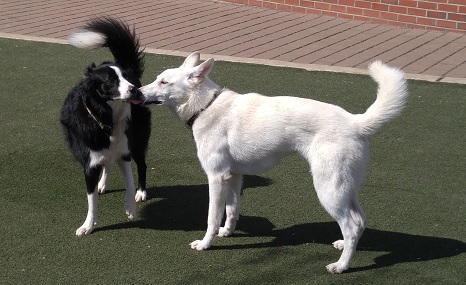
|
Instead, choose play dates wisely. Find other puppies who have had their age-appropriate shots with whom your puppy can play. Puppy players with similar play styles and who are respectful of correction from their playmates will be good play partners. Disrespectful bullies or puppies whom your puppy bullies will not be the best play date matches, as each is learning undesirable play styles.
Even gentle adult dogs can be good teachers; just make sure they are fully vetted and that they are tolerant of puppy antics. With dogs as with people, not all adults appreciate the antics of youngsters.
Socialization to Other Animals
If you anticipate bringing other animals -- cats, for instance -- into the family, it's important that your pup is socialized to them early, during the sensitivity period. First introductions should be done carefully and positively, perhaps by offering each animal their favorite treat so that they start to associate the presence of the other with pleasant things rather than simply a time of sharing their favorite resource, you! Give them distance so that neither feels cornered or threatened.
In the beginning, do not leave the two alone together. You want to make sure that you are the master of all interactions -- a negative interaction without you present may cause irreparable damage.
Keep in mind that some breeds will have innate difficulties sharing their lives with other animals. For instance, since so many types of terriers were bred to chase rodents and small animals, a cat may experience a stressful life of constant playful chasing, even in the best of circumstances. So do your research before you begin your search for a puppy.
Socialization to Novel Experiences
Loud noises and sudden movements can be frightening to a dog. This is particularly troublesome for dogs raised in a suburban or rural environment, only to move to a more crowded, urban setting later in life. The sounds of traffic, emergency vehicles, crowds of people and dogs can all make for a terrifying carnival-like atmosphere for a dog raised in the suburbs.
Make special efforts to expose your puppy to different environments during her sensitivity period. Challenge him with different surfaces (linoleum, wood, rug...) and terrains (grass, wooded, paved...). Take field trips, armed with all your pup's favorite treats and toys. Start easy and gradually get more challenging: Don't start her education on Main Street! Start on a quieter byway and then, depending on how well she's adapting, find streets with more activity gradually.
This also goes for introductions to noises like fireworks, thunderstorms, the hairdryer and the vacuum cleaner. Start with the puppy in a room where the volume of the noise is muffled. Pair the noise with fun, pleasurable things -- perhaps her favorite chewy or a fun game of tug! If she can't play, then it's just too much for her; tone it down a bit and advance more slowly.
The Lesson
And so it bears repeating: There's no such thing as over-socialization! There's no going back to these early weeks. Once your pup's book is written, you can only overlay it with new experiences, but these core, underlying chapters will always remain. So for your puppy to learn to love her lifescape is her most important lesson. The rest will come in good time!
